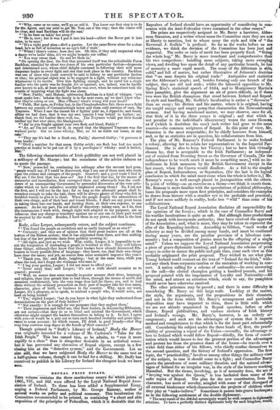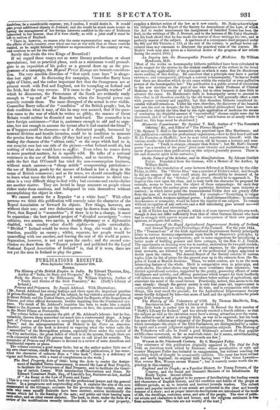REPEAL PRIZE ESSAYS. _
Tars volume contains the three meritorious essays for which prizes of 1001., 751., and 501. were offered by the Loyal National Repeal Asso- ciation of Ireland. To these has been added a Supplemental Essay, urging a Federal Parliament, by Mr. George Ramsay, author of several works on polity and political economy. This lucubration the Committee recommended to be printed, as containing "a short and able exposition of the principles of Federalism, which it is desirable that the
Repealer& of Ireland should have an opportunity of considering in con. nexion with the Anti-Federalist views contained in the other essays!'
The prizes are respectively assigned to Mr. Barry a barrister, Alder.- man Staunton, and a writer whose name the Committee state they are not at liberty to mention, but to whose essay the style and title of " the Reverend J. Godkin " is prefixed. So far as the works before us are evidence, we think the decision of the Committee has been just and impartial. The order or ratio of merit has been properly fixed. "Going the whole hog," Mr. Barry is more trenchant and comprehensive than his two competitors : handling more subjects, taking more sweeping views, and dwelling less upon the detail of any particular branch, he has of necessity a more rapid march. The essay of the Alderman is able, solid, 7 and full of matter, but rather illustrative of Johnson's doctrine that " no man forgets ?fis original trade." Antiquities and statistics are the Alderman's staple; and, besides forming only one branch of the subject, they are old and stale ; whilst the laboured opposition to Mr. Spring Rice's statistical speech of 1834, and to Montgomery Martin's later pamphlet, give the argument an air of grave ridicule, as if these two were the British champions that stood between Ireland and Repeal. In style and handling, Mr. Godkin's lucubration is rather a "discourse" than an essay; his diction and his matter, where it is original, having the turgid energy and empty pomp that characterize the Noneomformist sermon. And having mentioned matter, we may observe, once for all, that little of it in the three essays is original ; and that which is not peculiar to the individual's idiosyncracy wears the same likenese, as if (which is doubtless the case) each writer had gone to the same sources—the common scriptures of Repeal. In this point of view, Mr. Staunton is the most respectable; for he chiefly borrows from hiisel4 and, so far as statistics are in question, his collaborateurs from him.
The plan of Mr. Ramsay's Federal Parliament is to make Ireland a colony, allowing her to retain her representatives in the Imperial Par- liament. She is also to keep her Viceroy ; but to have him virtually chosen by, that is acceptable to the Irish Parliament; as independ- ent of control from Downing Street as the Governor of Canada, [for the independence to be worth much it must be something more,] with no in- terference in Irish measures by the British Government except in the last resort, when the Crown would disallow. As a foil to the simpler plan of Repeal, Independence, or Separation, (for the last is the logical conclusion to which the mind must come when the whole is before it,) Mr. Ramsay's essay is well enough placed in juxtaposition with the others. In point of writing—as an exercise on a theme—we think it excels them. Mr. Ramsay is more familiar with the speculations of political philosophy, bases his proposals more upon first principles, and considers the examples he draws from history with a steadier eye to the probable and practical; and if not more unlikely in reality, looks less " wild " than some of his collaboratenrs.
The Loyal National Repeal Association disclaims all responsibility for the opinions of the Essays ; which in the case of Counsellor Barry and his warlike lncubrations is quite as safe. But although these productions do not speak with incorporate authority, they have received the approval of the Association • and, what is more, they may be taken to represent the elite of the Repealing intellect. According to Gibbon, "such works of industry as may be divided among many hands, and must be continued during many years, are the peculiar province of a laborious com- munity; but a composition of genius must be the offspring of a single mind.' Unless we suppose the Loyal National Association perpetrating a piece of grave diplomatic humbug, and proposing the scheme of prize essays in order to amuse the public and gain time, some such view as this probably originated the prize proposal. They wished to see what plan Young Ireland could concoct on the text of "Ireland for the Irish," with- out any check from corporate caution or the restraints of working in con- cert. A nation calling for a scheme of nationality—its sons answering to the call—the elected champion getting a hundred pounds, and his proposal printed with the imprimatur of Loyalty and Nationality—fill the mind, and attract an attention which, Booth to say, the pamphlets would never have otherwise received.
The other prizemen may be passed ; and there is some difficulty in considering Mr. Barry on this large scale. Looking at the matter, the style, the arguments, and the propositions in their elements, and not in the form which Mr. Barry's arrangement and particular disposition may have imparted to them, there is little with which we are not already acquainted in Repeal speeches, before or after dinner, Repeal publications, and various reviews of Irish history and Ireland's wrongs. Mr. Barry's, however, is an orderly ar- rangement; and such are the advantages of system that it imparts method and completeness to that which is for the most part substantially old. Considering his subject under the three heads of, first, the practi- cability of procuring a repeal of the Union—secondly, the advantage or loss to Ireland which would follow Repeal—thirdly, the form of consti- tution which would insure to her the greatest portion of the advantages and protect her from the greatest share of the losses—he travels over a wider field than either of his fellows, who chiefly confine themselves to the second question, and the history of Ireland's oppression. The first topic, the "practicability," involves among other things the military view of the subject, in case it should come to a fight ; and Counsellor Barry sports the paradoxes of some military theorists and the natural advan- tages of Ireland for an irregular war, in the style of the lecturer teaching Hannibal. But the theme, involving, as it of necessity does, the act of "levying war against the Queen," is less hacknied than many of the safer topics of Repeal. The plan for the new constitution, from itS character, has more of novelty, mingled with some of that disregard of all external hindemnee which characterizes the projects of children when they play at "make-believe." Sometimes it passes into grave burlesque; as in the following settlement of the double diplomacy. "The next result of the divided sovereignty would be with respect to diplomatic relations. To have a perfectly distinct diplomatic body for each kingdom, would, doubtless, be a considerable expense; yet, I confess, I would desire it. It would gwe' great additional dignity to Ireland; and she would be much more secure in having the management of her foreign interests confided to the care of Irishmen interested in her honour, than if it were chiefly, as with a joint staff it must be left to natives of England.
" There is, however, no reason why the same representative may not manage the affairs of each country, even when one was at war with that at whose court he resided, as he might formally withdraw as representative of the country at war, and continue to act for the other."
Surely this rivals the two Kings of Brentford ! If we regard these essays not as mere literary productions or closet speculations, but as practical plans, such as a statesman would promul- gate in an exposition of his policy or a general draw up as the pro- gramme of a campaign, the Repeal Prize Essays are beneath considera- tion. The very sensible direction of "first catch your hare" is altoge- ther lost sight of. In discussing his campaign, Counsellor Barry loses sight of Ulster, and the rather important fact that the Orangemen are at present wroth with Peel and England, not for trampling on Ireland and the Irish, but the very reverse. If it came to the "guerilla warfare" of which he discourses, the Protestants of the North are evidently ready enough to "up and at" the Repealers, when the Imperial power can scarcely restrain them. The same disregard of the actual is ever visible. Counsellor Barry talks of the "condition" of the British people; but, be their condition what it may, of this he may rest assured, that if the ques- tion came to the war of which he writes so glibly, the masses of Great Britain would neither be disunited nor backward. The counsellor is to have foreign assistance—" that is, assistance enough to aid and to orga- nize, but not enough to assume the tyrant after it had enacted the friend"; as if beggars could be choosers—as if a distracted people, harrassed by internal division and hostile invasion, could be in condition to measure the precise force that their allies (if they had any) nioutd send. In esti- mating the chances of the "ultima ratio," or the steps which lead to it, our essayist sees but one side of the picture—what Ireland could do, but nothing of what she would have to suffer. Even when he comes down to more practical matters, he is equally wild. He talks of a national resistance to the use of British commodities, and to taxation. Putting aside the fact that O'Connell has tried the non-consumption business, without much success—a "cheap article" overpowering patriotism— the use of British goods by the masses of Ireland is but a drop in the ocean of British commerce ; and as for taxes, we should exceedingly like to learn what taxes the Irish pay ? A national resistance to direct tax- ation is a very difficult thing to deal with ; but customs and excise-duties are another matter. They are levied in large amounts on people whose riches make them cautious, and indisposed to ruin themselves without accomplishing the object in view.
We cannot answer for a Repealer "at a white heat." With other persons we think this publication will scarcely raise the character of the Repeal Association or forward its objects. Few things, however, are without their use; and two deductions may be drawn from this volume. First, that Repeal is " moonshine " ; if there is to be a change, it must be separation : the best painted project of "divided sovereignty "—two cabinets, two armies, two navies, a double diplomacy or a diplomatist doubled, with sundry other double sights—is quite unworkable. " Divided " Ireland would be worse than a drag, she would be a dis- traction, possibly an enemy ; whilst, separate, her people would be quarrelling with one another, and leaving the rest of the world at peace. Separation, however, is not yet upon the cards ; and the second con- clusion we draw from the "Essays printed and published for the Loyal National Repeal Association of Ireland" is, that if it were, there are not yet the men in Ireland to play the game.



































 Previous page
Previous page